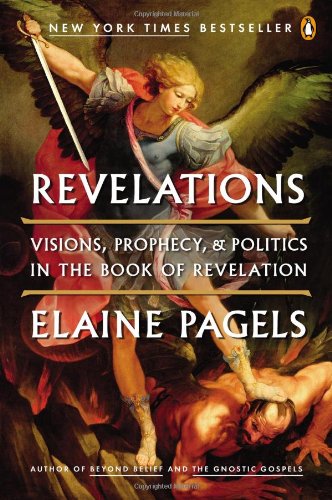Book review: Revelations: Visions, Prophecy & Politics in the Book of Revelation
by Elaine Pagels
★★★★★
Look. If Pagels writes a book, go buy it. You don’t need a review, you just need a reminder that it’s ready for purchase. But then I’d feel like I wasn’t doing my job, so …
I’ve been looking forward to Pagel’s new book, hoping I would read her views on how to interpret Revelation, but this wasn’t her focus. Pagels begins by discussing the apocalyptic writings of the early Christian period. The title, Revelations, is not a misspelling of the final book in our Bible; she really does mean “revelations” in the plural. She highlights several other visionary writings, including The Revelation of Peter, The Secret Revelation of James, and The Secret Revelation of John. It turns out the unexpected focus didn’t disappoint me.
Pagels then progresses through the next few hundred years of Christianity, detailing how Revelation was received (or not!) by the Church, the argument over its authorship, and how its prophecies were used to bolster or condemn. Irenaeus and Justin the Philosopher strongly championed John’s Apocalypse, both of them certain that its promise of tribulation could be seen plainly in the Christian persecution they were already witnessing. Tertullian praised John for the courage to portray Rome as Babylon, “proud of her power, and victorious over the saints,” but damned and doomed. Even Constantine got in on the act, claiming that his rival, Licinius, was represented in Revelation by the dragon. Constantine wrote in a letter to Eusebius that he had restored “liberty to the human race” after he drove “that dragon out of public administration.” Still, the vengeful book of Revelation barely squeaked into the Christian canon.
In the few instances where Pagels does attempt an interpretation of the original meaning of Revelation, her perspective is strongly influenced by her exhaustive studies in the Gnostic Gospels—the Nag Hammadi findings—and this emphasis shines a different light on the topic. For example, she compares Revelation to 4 Ezra (the Revelation of Ezra), a Jewish book somewhat contemporary with Revelation. Revelation is Christian, Ezra is not. But because she dates them concurrently (early 90’s) and notes their similarities, she lets one aid in the interpretation of the other.
I loved the book, but I can’t help contributing my two cents. I disagree with her approach to interpretation, believing that we can date Revelation to perhaps fifteen years earlier, so its teachings should stand more firmly on their own. History and Christian thought were changing rapidly during this period, and even fifteen years makes a major difference. One example: In a discussion of the hated “Babylon” in Revelation, I believe its original meaning referred not to Rome, but to Jerusalem. Only later, when Revelation’s dreams failed to quickly materialize, did Christians lose interest in Jerusalem and shift to interpreting Babylon as Rome. Far more clues point to Jerusalem as the original intended meaning, and I think I’ll run a blog series shortly with the arguments for Jerusalem. Keep an eye on my blog at www.dubiousdisciple.com.












 354 Circles
354 Circles
 603 Goodreads Friends & Fans
603 Goodreads Friends & Fans

 Hello! I'm an author, historical Jesus scholar, book reviewer, and liberal Christian, which means I appreciate and attempt to exercise the humanitarian teachings of Jesus without getting hung up on any particular supernatural or religious beliefs.
The Bible is a magnificent book that has inspired and spiritually fed generations for thousands of years, and each new century seems to bring a deeper understanding of life’s purpose. This is true of not only Christianity; through the years, our age-old religions are slowly transforming from superstitious rituals into humanitarian philosophies. In short, we are growing up, and I am thrilled to be riding the wave.
I avidly read all thought-provoking religion titles. New authors: I'd love to read and review your book!
Hello! I'm an author, historical Jesus scholar, book reviewer, and liberal Christian, which means I appreciate and attempt to exercise the humanitarian teachings of Jesus without getting hung up on any particular supernatural or religious beliefs.
The Bible is a magnificent book that has inspired and spiritually fed generations for thousands of years, and each new century seems to bring a deeper understanding of life’s purpose. This is true of not only Christianity; through the years, our age-old religions are slowly transforming from superstitious rituals into humanitarian philosophies. In short, we are growing up, and I am thrilled to be riding the wave.
I avidly read all thought-provoking religion titles. New authors: I'd love to read and review your book!
 Hi! While Lee writes the articles and reviews the books, I edit, organize, and maintain the blog. The views expressed here are Lee's but I'm his biggest supporter! :-)
Hi! While Lee writes the articles and reviews the books, I edit, organize, and maintain the blog. The views expressed here are Lee's but I'm his biggest supporter! :-)
Connect With Me!